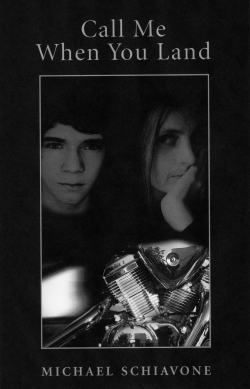Call Me When You Land
At the end of August 2011, Tropical Storm Irene left nearly 700,000 Massachusetts residents without power. Trees were downed. Subways sat idle. And the flooding of low-lying areas of the state meant a scattering of localized highway closures. But all the paralysis caused by the storm’s furious wind and rain amounts to mere inconvenience compared to the quiet devastation perpetually on the verge of breaking in Michael Schiavone’s debut novel*, Call Me When You Land*.
Set in the fictitious coastal town of Newquay, Massachusetts, Call Me When You Land opens in the winter of 2007. Katie Olmstead receives a call informing her that Craig, her ex-husband and her son, C.J.‘s, father, has died, leaving them a storage pod. Grief would have been more bearable for the family than the confusion that follows the news. With minimal memories of the man, C.J. is at a loss when it comes to processing his father’s sudden death. Katie’s anesthetic, Grand Marnier or whatever is handy, numbs her to the emotional pain, but keeps her painfully confused. The pod’s arrival offers no solutions. Its contents, a Harley Davidson Road King, becomes the physical manifestation of all of Katie’s fears of the world and C.J.’s frustrated desire for freedom.
Unlike Katie, whose career as an artist is a series of missed deadlines, creative blocks, and dead-end auxiliary jobs bartending, the numbers behind Schiavone’s literary endeavors define focus and determination. Since 2003, Schiavone has won four writing contests, including the Glimmer Train Very Short Fiction Award twice, and has been a finalist, shortlisted, or placed thirty-two times.
His short stories, collected in You’d Be Crazy Not to Love It Here, have appeared publications including Glimmer Train, Narrative Magazine, Inkwell, and the Mississippi Review.
In the hands of a lesser writer, Katie’s slow slide from functional to dysfunctional alcoholism would have been a tedious study of failure; her son’s bottled rage escaping in destructive bursts, a tired plot of teenage angst. Schiavone’s writing, however, contains the relentless power of the cold Atlantic Ocean. His characters drown in wave after wave of unvoiced pain because they know those around them “wouldn’t care to hear that it was the so-called scoundrels who suffered most.”
And yet, the “insignificant details” belie the depths to which Schiavone writes. When an old man dies, in one beautiful example, his last convenient store purchases illustrate an obituary more eloquent than any newspaper could run: a Tab energy drink, a Whoopie Pie, and three Red Sox lotto tickets, all losers.
All storms eventually fade and lives heal. While Call Me When You Land ends with small steps forward, it contains no quick fixes. Like Irene, the destruction never becomes as bad as it could have been. Those who experience it gain the knowledge that there will always be time to heal.
Reviewed by
Joseph Thompson
Disclosure: This article is not an endorsement, but a review. The publisher of this book provided free copies of the book and paid a small fee to have their book reviewed by a professional reviewer. Foreword Reviews and Clarion Reviews make no guarantee that the publisher will receive a positive review. Foreword Magazine, Inc. is disclosing this in accordance with the Federal Trade Commission’s 16 CFR, Part 255.

